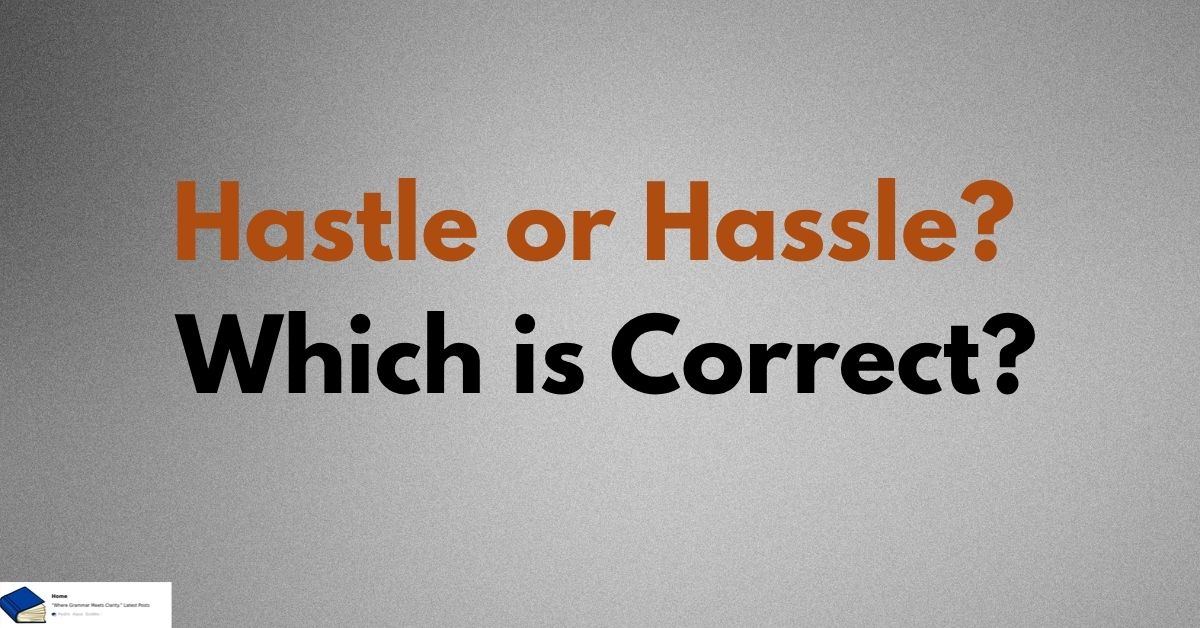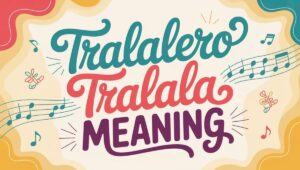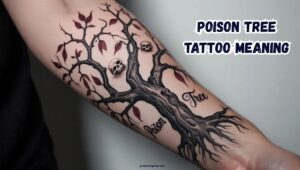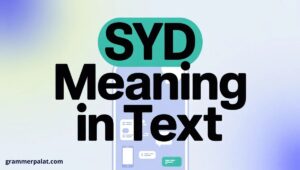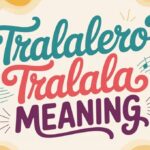Ever stared at a word and thought, “Wait… is that how you spell it?” You’re not alone. One of the most commonly misspelled words in English is hassle. People often write hastle, thinking it’s the right form. But is it? Let’s settle the hastle or hassle debate once and for all and learn more along the way.
What’s the Correct Spelling: Hassle or Hastle?
Let’s get this straight from the beginning: “Hassle” is the correct spelling.
The version “hastle” is incorrect and doesn’t exist in standard English dictionaries like Merriam-Webster or Oxford.
Still unsure? Just plug “hastle” into any spell-checker or online dictionary. You’ll get red squiggly lines and no definition. That’s because hastle is a common spelling mistake, not a real word.
🔤 Correct spelling of hassle: H-A-S-S-L-E
❌ Incorrect spelling: H-A-S-T-L-E
Why Do People Confuse “Hastle” and “Hassle”?
There are a few reasons this confusion happens:
- Phonetics: The word hassle sounds like it could include a “t” in the middle, especially when spoken quickly or with certain accents.
- Silent Letters: English is full of tricky silent letters think castle, whistle, wrestle. So, people might assume hastle follows a similar rule.
- Autocorrect Errors: Some devices mistakenly suggest “hastle” due to user habits or limited keyboard dictionaries.
- Typo + Guessing Combo: Sometimes, people just guess the spelling based on sound and guess wrong.
This mix of mishearing and guessing is what causes the spelling confusion in English.
The Meaning of Hassle (With Real-Life Examples)
So, now that we know how to spell it, what does hassle mean?
Hassle Definition (as a noun):
A situation that causes difficulty, inconvenience, or annoyance.
Example:
“Dealing with airport security is always such a hassle,” said Emily, sighing at the long line.
Hassle Definition (as a verb):
To bother, annoy, or harass someone repeatedly.
Example:
“Stop hassling me about cleaning my room!” yelled Jason from upstairs.
The word hassle can describe both the situation and the action that causes stress or annoyance.
Hassle vs Hustle: Are They the Same Thing?
This one trips up a lot of people, too. Many mix up hassle vs hustle, even though their meanings are completely different.
| Word | Part of Speech | Meaning | Example |
|---|---|---|---|
| Hassle | Noun/Verb | An inconvenience or to annoy | “Returning the item was a hassle.” |
| Hustle | Noun/Verb | Energetic activity or to move quickly, sometimes with force or energy | “She had to hustle to catch the train.” |
So if you’ve ever said, “He was hustling me,” be careful it doesn’t mean he was hassling you. It might mean he was working hard… or trying to scam you, depending on the context.
Hassle in Popular Culture
The word hassle has appeared in everything from movie quotes to sitcoms and pop songs. Here are a few notable examples:
- In The Simpsons, Homer once declared, “I don’t want the hassle of thinking for myself.”
- The phrase “No hassle guarantee” is often used in commercials to assure easy returns or customer service.
- “What’s the hassle?” is a common slangy phrase meaning “What’s the problem?”
Clearly, hassle has become embedded in modern language not just formally but also in casual conversation.
Why Is Hassle Spelled with Double “S”?
Here’s a little etymology to answer that.
The word hassle originated in American English in the 1940s, likely as slang. While its exact root is debated, some etymologists believe it comes from a blend of “haggle” and “tussle.”
That double “s” likely came from “tussle,” which means to scuffle or fight. So hassle carries that same energy an irritating back-and-forth, whether verbal or situational.
So now you know: “Why is hassle spelled with double ‘s’?” Because it shares roots with words that involve struggle and conflict.
Using Hassle in a Sentence (Like a Native Speaker)
Let’s go over a few sentence examples to solidify your understanding:
Hassle as a Noun:
- “There’s always a hassle when I try to cancel my cable subscription.”
- “Renting a car abroad was more of a hassle than I expected.”
Hassle as a Verb:
- “Don’t hassle the waiter; he’s doing his best.”
- “My boss keeps hassling me for the report.”
Knowing how to use hassle correctly can make your writing and speech feel more natural and fluent.
Hassle vs Hastle vs Hustle – The Triple Confusion
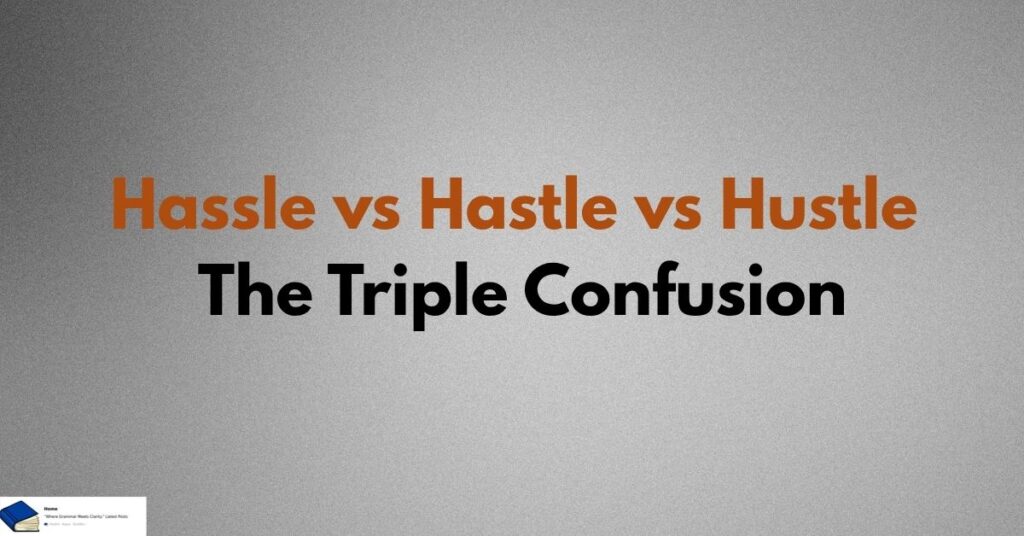
English learners and even native speakers often confuse these three terms. Let’s clear up this linguistic traffic jam.
Hassle:
As we’ve covered, it refers to annoyance or inconvenience (noun), or to annoy/bother someone (verb).
Example: “Getting a refund was a real hassle.”
Hustle:
This word is all about energy, speed, or effort. It can also mean scamming or hard work, depending on context.
Example: “He had to hustle to make it to work on time.”
Hastle:
This is the odd one out because it’s not a real word. Still, people type or say it, leading to the common mix-up.
Example (incorrect): “It was such a hastle to reschedule.”
Corrected: “It was such a hassle to reschedule.”
This comparison makes the hassle vs hustle distinction more clear. Remember: Hustle is about energy. Hassle is about annoyance. Hastle doesn’t exist.
Hastleno Hassle Meaning – What’s This Hashtag All About?
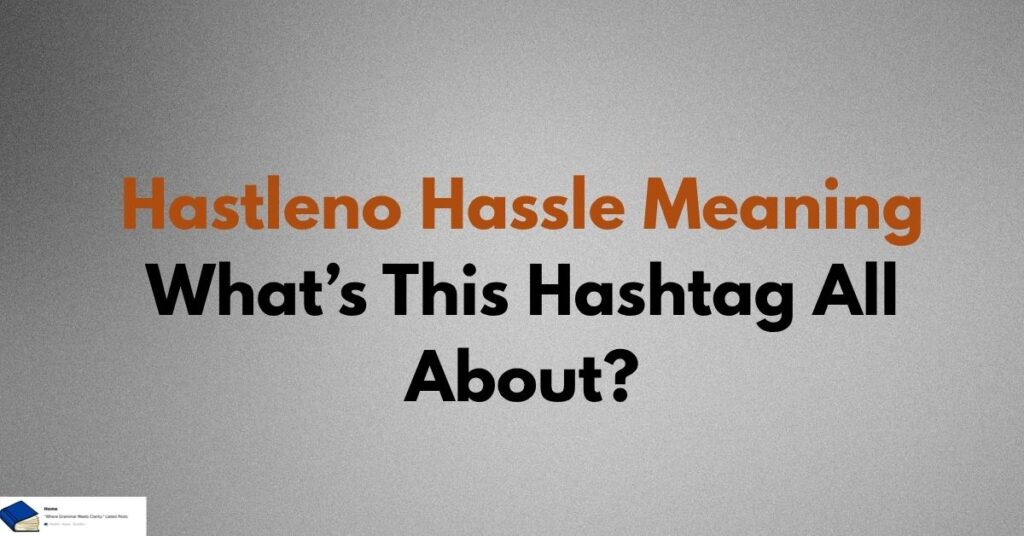
You might’ve seen #HastlenoHassle on TikTok, Instagram, or YouTube. So, what does “hastleno hassle” mean in internet lingo?
It’s a creative mashup of hustle and hassle, typically used to imply:
“Work hard (hustle), but don’t let it become a hassle.”
Influencers, entrepreneurs, and motivational speakers often drop this phrase to promote a balanced approach to life or work. It encourages productivity without burnout.
Example Use:
“My Monday vibe: #hastlenohassle. Get it done, but stay chill.”
So, while hastle is wrong in formal English, in this context, “hastle” is intentional used for creativity and branding.
Why Do People Confuse Hassle and Hustle?
This mix-up often happens because the words:
- Sound similar (especially in fast speech)
- Both end in -le
- Can refer to challenging situations
But context is key.
| Confusion | Why it happens | Fix it by remembering… |
|---|---|---|
| Hassle vs Hustle | Both involve stress or pressure | Hassle = annoyance. Hustle = effort. |
| Hastle | Mistaken blend of both words or a typo | It’s not a real word avoid it entirely. |
So if you’re wondering “how to use hassle and hustle properly?”, just pause and think about what you’re trying to say. Is it about stress? That’s a hassle. Is it about grinding or working fast? That’s hustle.
How to Avoid Common Spelling Mistakes Like “Hastle”
Here are some spelling tips for hassle:
- Double Trouble Rule:
When in doubt, remember: “Hassle has two S’s because it stresses you out twice as much.” - Mnemonic for Hassle: How Annoying, So Stressful, Life’s Errands!
→ The double S is easy to recall. - Use Spell Check Tools:
Rely on grammar tools like Grammarly or built-in browser spell checks. - Practice with Real Sentences:
The more you see hassle in daily situations, the easier it becomes to remember the spelling. - Read More:
You’ll naturally absorb spelling patterns the more you read especially in trusted publications.
Using “Hassle-Free” in Writing
One of the most common phrases involving this word is “hassle-free.” You’ll spot it everywhere from ads to travel blogs to return policies.
In Marketing:
“We offer hassle-free returns within 30 days.”
In Travel:
“Book your hassle-free vacation now!”
In Business:
It’s often used as a selling point to convey ease and simplicity something people crave in today’s chaotic world.
So if you’re wondering how to use hassle-free in writing, think convenience, no obstacles, smooth process.
Hassle in Literature and Pop Culture
Although it’s slangy in origin, hassle has worked its way into books, shows, and even politics.
- In modern fiction, characters often say “What’s the hassle?” to show informal dialogue.
- In memoirs, it might be used to describe bureaucratic delays or family tension.
- In TV dramas, someone getting hassled might face harassment or unwanted attention.
- Even celebrities like Jennifer Lawrence have described red-carpet events as a “massive hassle.”
This shows how flexible and culturally embedded the word is. Whether you’re writing a blog or a script, knowing how to use hassle properly adds realism and relatability.
Examples of Hassle in Daily Life
Here’s a snapshot of how people use hassle in everyday conversation:
- “Filing taxes is always a major hassle.”
- “I love my dog, but grooming him is such a hassle.”
- “She kept hassling me to join the gym.”
These real-life examples of hassle help the meaning sink in and show how widespread the word is.
What Does Getting Hassled Mean?
You’ve probably heard someone say, “I got hassled at the mall” or “The manager keeps hassling me.”
So what does getting hassled mean?
It refers to being:
- Repeatedly annoyed
- Pressured unnecessarily
- Bothered in an aggressive or persistent way
It’s not just light irritation it often implies unwanted interaction, sometimes to the point of feeling harassed.
How to Spell Hassle Correctly
Let’s make this easy. Here’s a simple breakdown:
| Word | Spelling | Part of Speech | Use Case |
|---|---|---|---|
| Hassle | ✅ Correct | Noun/Verb | Stress, annoyance, to bother |
| Hustle | ✅ Correct | Noun/Verb | Energy, work hard, move quickly |
| Hastle | ❌ Incorrect | – | Not a real word in the English language |
If you’re ever unsure, remember this checklist:
- Does it involve frustration? → Hassle
- Does it involve movement or drive? → Hustle
- Does it contain a “T”? → Probably a typo
Conclusion
Let’s wrap it all up.
- The correct word is hassle.
- Hastle is a common misspelling with no place in formal writing.
- Hustle is a totally different word with its own meaning.
So whether you’re emailing a coworker, captioning your TikTok, or writing a blog post, use hassle with confidence. It’s a word that carries real-world meaning, emotional context, and even pop culture flair.
And hey next time someone asks “Hastle or Hassle?” you’ve got the perfect answer.
